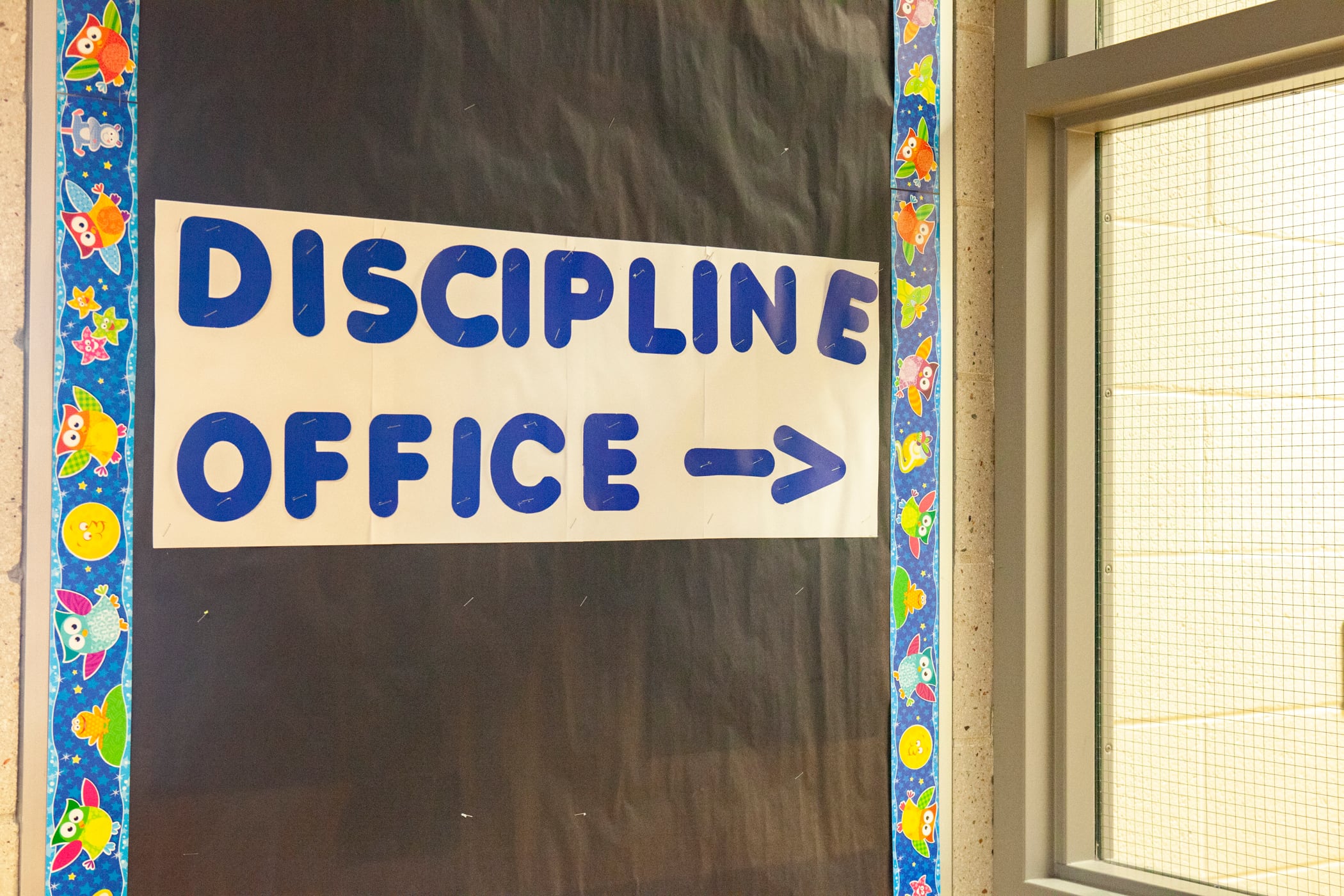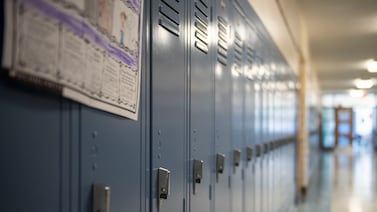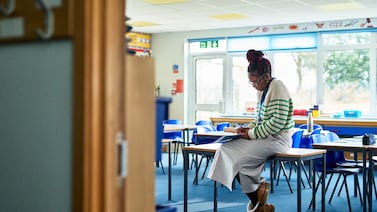Through more training for police who work in schools, more transparency around student discipline, and new limits on the use of handcuffing and seclusion rooms, advocates hope to see schools become safer and more supportive places, especially for students of color and those with disabilities.
A bill introduced in the Colorado House this week calls for significantly more data collection, more public reports on school discipline practices, and fewer loopholes that allow Colorado school districts to essentially police themselves when it comes to seclusion and restraint.
Critically, the bill would give the Colorado Department of Education the authority to order school districts to correct their practices when they violate students’ rights.
The larger goals are to improve school climate and prevent students from entering the school-to-prison pipeline.
“We want to set kids up for success,” said Krista Spurgin, executive director of the Colorado chapter of Stand for Children, an advocacy organization. “If kids are constantly getting in trouble or being told they’re a troublemaker or even getting arrested, you start to see that cycle repeat itself.”
The bill makes three main changes.
- It would require the state education department to collect more data on school climate, student discipline, and law enforcement referrals and make that information easily accessible. The data would be broken down by race, ethnicity, gender, family income, English learner status, and disability status to make it easier to see which student groups are most affected by certain discipline practices.
- It would limit the use of physical restraints and seclusion rooms. It would ban handcuffing students except in limited circumstances. It would require schools to document physical holds that last longer than a minute, and prohibit using offices and broom closets for student seclusion.
- It would set new standards for school resource officers, including that they have experience working with youth and want to work in schools. It would give school officials more say in evaluating officers’ performance and in which officers work in schools.
Advocates hope that by gathering more data and making it more publicly available, they can identify exemplary schools and schools that rely too much on suspensions, expulsions, and other discipline practices that can derail children’s school experience. This data could help develop new policies and direct resources, they said.
“Eventually we would like to get to a place where we have a vision for school and student success that includes a healthy school climate and provides a safe and supportive learning environment for all students,” said Leslie Colwell of the Colorado Children’s Campaign. “To get there, there are some steps that need to happen first. We think this bill lays the foundation for this work that needs to come first.”
The bill developed from conversations that started after a school discipline reform bill was withdrawn last year amid fierce opposition from law enforcement and suburban school districts. But advocates insist this year’s effort is not a re-do. The effort was informed by statewide conversations last summer about improving school climate. Advocates tried to identify steps that would lead to concrete improvements without casting police as the problem or limiting how they do their job.
For example, last year’s bill included a long list of infractions that police would be prohibited from responding to when they occurred on school grounds. Instead, this year’s bill calls for a model policy for school resource officers, the recruitment of officers who want to work in schools, and roles for both school and police officials in evaluating school resource officers, rather than officers only reporting to their police supervisors.
Several of the bill’s provisions deal with the use of seclusion and restraint, practices that overwhelmingly affect students with disabilities.
State Rep. Mary Young, a Greeley Democrat and former school psychologist, said she doesn’t aim to ban seclusion or restraint. In her job, sometimes a child needed to be in a quiet room to calm down or an adult needed to place a child in a hold so they wouldn’t hurt themselves or another student.
“We just want to make sure they’re done appropriately so children are safe,” she said.
Young is sponsoring the bill with state Rep. Leslie Herod, a Denver Democrat who was a driving force behind last year’s withdrawn school discipline bill and 2020’s landmark police reform bill.
Young said this year’s bill should provide better definitions and clearer reporting requirements while still allowing flexibility to respond to student behavior.
“We’re trying to make sure that we as a state are doing it in a way that we are reducing behaviors instead of increasing them,” Young said.
A 2017 law already requires school districts to conduct annual reviews of their use of seclusion, which means shutting a student in a room, and restraint, which the law defined as putting a student in a physical hold for more than five minutes. But they don’t have to post that information publicly or share it with the Colorado Department of Education.
A Chalkbeat investigation found wide variations in how school districts tracked and reported this information. Some districts’ reviews were several pages long and full of data. Others were just a few sentences with no data at all. Even when districts included data, it was inconsistent. Some lumped seclusion and restraint together, while others separated them. Some reported holds that lasted less than five minutes. Others didn’t.
And because districts don’t have to submit their annual reviews to any government agency, there is little oversight.
Even when the state found that districts were in violation of state rules, the state had no enforcement powers. The bill gives the state new enforcement powers to order corrective action plans and compensatory services for students and to monitor school districts that have ongoing problems.
Jennifer Levin, director of public policy for the ARC of Colorado, said many of the students who are placed in holds or closed in seclusion rooms aren’t able to tell their parents what happened. Parents see bruises or notice that their child is more withdrawn, but don’t know what happened.
By requiring schools to document all holds that last longer than a minute, Levin hopes to open up more conversations about what can be done to head off student outbursts before they happen.
“Any time a student is placed in any of these types of restraints, whether it is physical restraint or seclusion, it brings up trauma,” Levin said. “And we find students who are suddenly very fearful and anxious about schools, and some of these students don’t have the capacity to verbally express what happened.”
Spurgin said that collecting more data is a necessary step to understand what’s happening in schools and find the right solutions.
“Our students of color are targeted, more specifically our male students of color,” Spurgin said. “The disaggregated data we will get from this bill is so important. Often you hear anecdotal reasons why certain student groups are disciplined more, arrested more, handcuffed more, but until we have the data, I think it will be hard to convince educators that there is bias in the system.
“It’s not pointing a finger, but pointing out what happens when we see students of color as more problematic than white students.”
It’s not clear whether this measure will face significant opposition. School districts, especially small rural ones, consistently push back against requirements that they share more data or do more training. They say the requirements are burdensome and costly and make it harder to educate students.
The difficulties of the pandemic and staff shortages have amplified those objections. At the same time, many educators say student behavior problems and mental health needs have grown.
Bill supporters say they don’t intend to cast blame on classroom teachers or district administrators. They want teachers to have more tools, not fewer, to respond to challenging behavior.
“We have a sense that these disparities exist — that isn’t disputed at this point — but the data around this is not easy to find,” Colwell said. “We don’t know what is actually happening. We need that before we can start to figure out solutions.”
Bureau Chief Erica Meltzer covers education policy and politics and oversees Chalkbeat Colorado’s education coverage. Contact Erica at emeltzer@chalkbeat.org.
Jason Gonzales is a reporter covering higher education and the Colorado legislature. Chalkbeat Colorado partners with Open Campus on higher education coverage. Contact Jason at jgonzales@chalkbeat.org.






